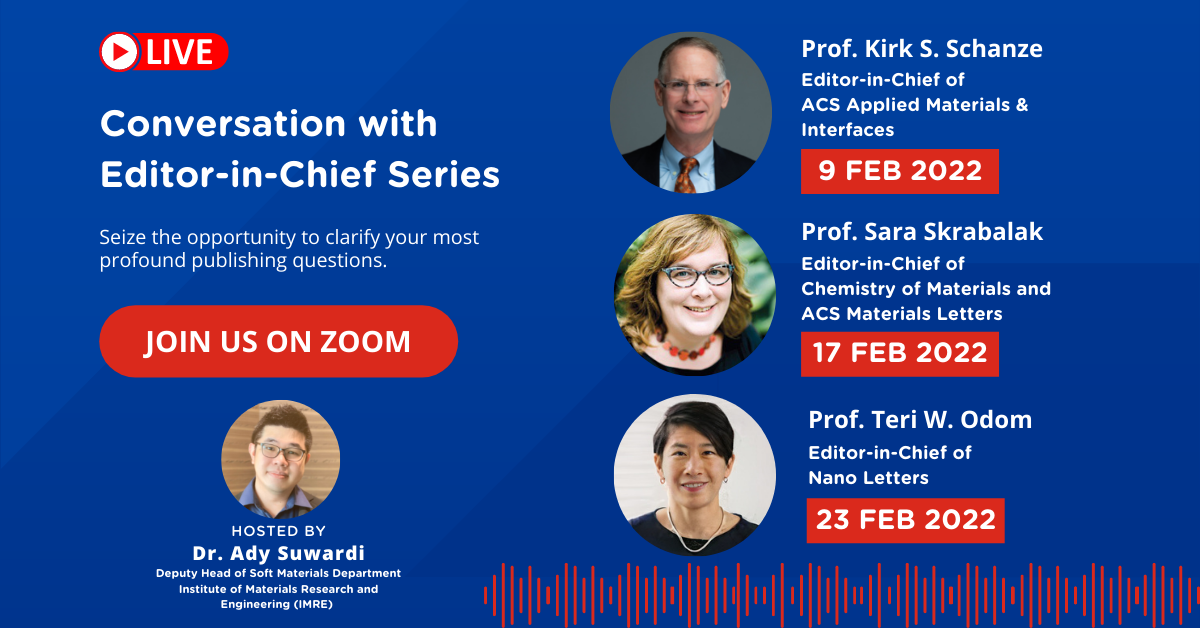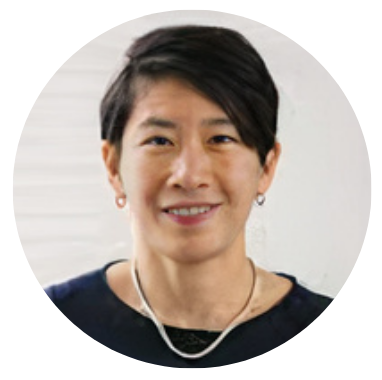Conversation with Editor-in-Chief Series
In this webinar, IMRE invites Editors-in-Chief from prestigious journals to share tips and tricks of writing successful research articles for publications.

Date
Speakers
Teri W. Odom is Charles E. and Emma H. Morrison Professor of Chemistry and Chair of the Chemistry Department at Northwestern University. She received her B.S. in Chemistry from Stanford University and Ph.D. in Chemical Physics from Harvard University. Odom carried out postdoctoral work at Harvard University before starting her career at Northwestern University in 2002. She is an expert in designing structured nanoscale materials that exhibit extraordinary size and shape-dependent optical and physical properties. Odom has pioneered a suite of multi-scale nanofabrication tools that have resulted in plasmon-based nanoscale lasers that exhibit tunable color, flat optics designed by genetic algorithms that show reconfigurable imaging, and hierarchical substrates that show controlled wetting and super-hydrophobicity. She has also invented a class of biological nanoconstructs that are facilitating unique insight into nanoparticle-cell interactions and that show superior imaging and therapeutic properties because of their gold nanostar shape.
Odom has received numerous honors and awards, including the ACS National Award in Surface Science; a Research Corporation TREE Award; a U.S. Department of Defense Vannevar Bush Faculty Fellowship; the Associated Student Government Faculty Honor Roll; the Carol Tyler Award from the International Precious Metals Institute; a Blavatnik Young Scientist Finalist in Chemistry and Physical Sciences and Engineering; a Radcliffe Institute for Advanced Study Fellowship at Harvard University; the ACS Akron Section Award; an NIH Director's Pioneer Award; the MRS Outstanding Young Investigator Award; the National Fresenius Award from Phi Lambda Upsilon and the ACS; the Rohm and Haas New Faculty Award; an Alfred P. Sloan Research Fellowship; a DuPont Young Investigator Grant; a NSF CAREER Award; the ExxonMobil Solid State Chemistry Faculty Fellowship; and a David and Lucile Packard Fellowship in Science and Engineering. Odom was founding Chair of the Noble Metal Nanoparticles Gordon Research Conference and founding Vice-Chair of Lasers in Micro, Nano, Bio Systems. She is on the Editorial Advisory Boards of ACS Nano, Materials Horizons (RSC), ChemNanoMat (Wiley), and Bioconjugate Chemistry. She was an inaugural Associate Editor for Chemical Science (RSC) and founding Executive Editor of ACS Photonics. ACS Publications has featured Odom’s Personal Story of Discovery.
About the Journal
Nano Letters is a forum for reporting original results on fundamental, applied, and emerging research in all areas of nanoscience and nanotechnology that require rapid dissemination. A chief criterion to fit within the scope of Nano Letters is the convergence of at least two different areas or disciplines. Areas of interest to the journal include:
- Experimental and theoretical results on physical, chemical, and biological phenomena at the nanoscale
- Synthesis, characterization, and processing of organic, inorganic, polymer, and hybrid nanomaterials by physical, chemical, and biological methods
- Modeling and simulation of synthetic, assembly, and interaction processes
- Realization of integrated nanostructures and nano-engineered devices with advanced performance
- Applications of nanoscale materials in living and environmental systems
Stay tuned for more information on the speakers lined up.
Past Webinars
Conversation with Editor-in-Chief | 2022
Conversation with Editor-in-Chief | 2021
9 February 2022
10am to 11am
(SG Time)

Prof. Kirk S. Schanze
Editor-in-Chief of ACS Applied Materials & Interfaces
Kirk Schanze earned his B.S. in Chemistry from Florida State University in 1979 and his Ph.D. in Chemistry from the University of North Carolina at Chapel Hill in 1983. He was appointed a Miller Postdoctoral Fellow at the University of California, Berkeley, from 1984-1986 and began his independent research career at the University of Florida in 1986. Schanze served as Professor of Chemistry and Chairman of the Organic Chemistry Division at the University of Florida. He was Distinguished Professor and held the Prominski Chair at the University of Florida until 2016. Since then he has held the Robert A Welch Distinguished University Chair at the University of Texas at San Antonio. He served as a Senior Editor for Langmuir from 2000 – 2008 and Editor-in-Chief of ACS Applied Materials & Interfaces since 2008. He has authored or co-authored 300 peer-reviewed articles on basic and applied research topics, with a primary focus on organic and organometallic materials chemistry, and is co-inventor in 20 patents or disclosures.
About the Journal
ACS Applied Materials & Interfaces serves the interdisciplinary community of chemists, engineers, physicists and biologists focusing on how newly-discovered materials and interfacial processes can be developed and used for specific applications. The editors are proud of the rapid growth of the journal since its inception in 2009, both in terms of the number of published articles and the impact of the research reported in those articles. ACS AMI is also truly international, with the majority of published articles now coming from outside the United States, capturing the rapid growth in applied research around the globe.
17 February 2022
9am to 10am
(SG Time)

Prof. Sara E. Skrabalak
Editor-in-Chief of ACS journals Chemistry of Materials and ACS Materials Letters
Sara E. Skrabalak is a Provost-appointed James H. Rudy Professor at Indiana University – Bloomington. She has appointments in the Departments of Chemistry and Intelligent Systems Engineering. She received her B.A. degree in Chemistry from Washington University in St. Louis in 2002 and her Ph.D. in Chemistry from the University of Illinois at Urbana-Champaign in 2007. She conducted postdoctoral research at the University of Washington in Seattle from 2007-2008 and began on the faculty at Indiana University – Bloomington in 2008. Prior to assuming the role of Editor-in-Chief for Chemistry of Materials and ACS Materials Letters, she served as an Associate Editor for Nanoscale and Nanoscale Advances, both from the Royal Society of Chemistry. She, with her students, has published over a hundred papers in peer reviewed journals and one book. Her research interests span a broad number of topics, with a focus on solid-state chemistry and nanomaterials, with strong influences from chemical engineering. Her group is largely known for providing hypothesis-driven approaches for the synthesis of new materials with defined crystal shape and architecture for applications in energy science, catalysis, separations, plasmonics, chemical sensing, and secured electronics.
About Chemistry of Materials
Chemistry of Materials is devoted to the publication of original contributions on forefront, fundamental research at the interface of chemistry, chemical engineering, and materials science. Both theoretical and experimental studies which focus on the preparation or understanding of materials with unusual or useful properties are relevant.
Among the research areas of interest are solid-state chemistry, both inorganic and organic, and polymer chemistry, especially as directed to the development of materials with novel and/or useful optical, electrical, magnetic, catalytic, and mechanical properties, among others. Also of interest are fundamental issues relating to the fabrication and processing of electronic, magnetic, or optical materials and devices, including the generation of thin films by chemical vapor and solution deposition.
Other appropriate topics include the design, synthesis, investigation, and application of polymeric and molecular precursors to solid-state inorganic materials (including sol-gel chemistry and polymer pyrolysis) and the preparation and study of biomaterials, nanomaterials, composites, catalysts, liquid crystals, coatings, thin films and interfaces, and self-organized molecular assemblies.
About ACS Materials Letters
ACS Materials Letters publishes high quality and urgent papers on the forefront of fundamental and applied research, at the interface between materials and other disciplines, such as chemistry, engineering and biology. Papers that showcase multidisciplinary and innovative materials research addressing global challenges are especially welcome. Submissions to ACS Materials Letters should clearly justify the need for rapid disclosure of key results. Areas of interest include, but are not limited to:
- Design, synthesis, characterization, and evaluation of forefront and emerging materials
- Understand structure, property, performance relationships and their underlying mechanisms
- Develop materials for energy, environmental, biomedical, electronic, and catalysis applications
A*STAR celebrates International Women's Day

From groundbreaking discoveries to cutting-edge research, our researchers are empowering the next generation of female science, technology, engineering and mathematics (STEM) leaders.
Get inspired by our #WomeninSTEM
.png?sfvrsn=b59474e9_3)
